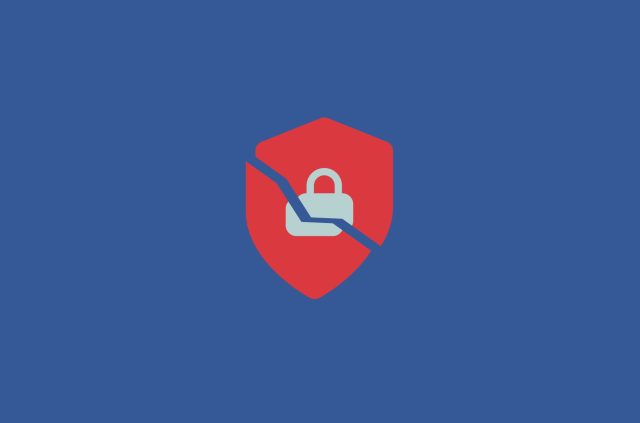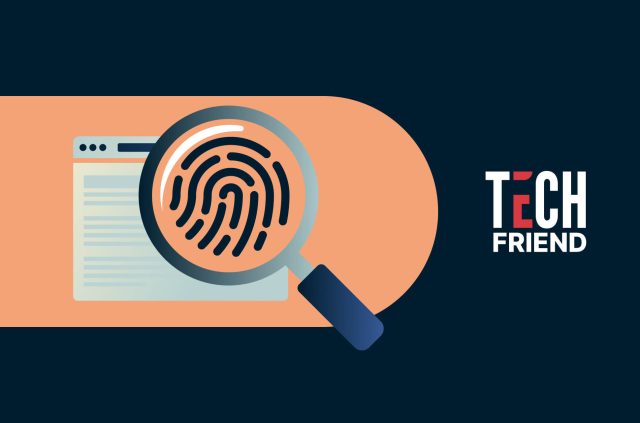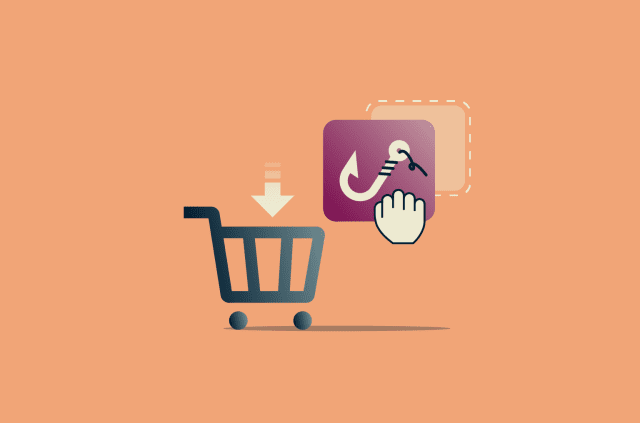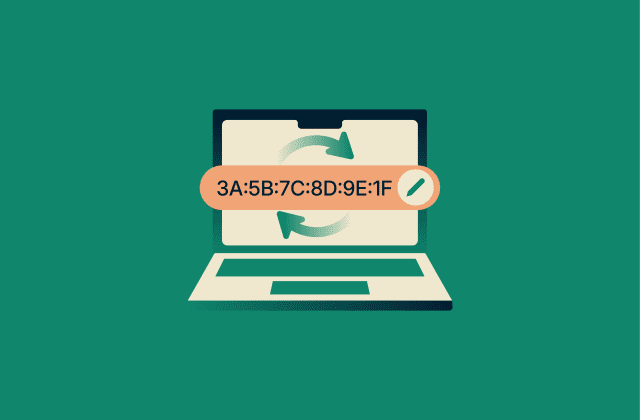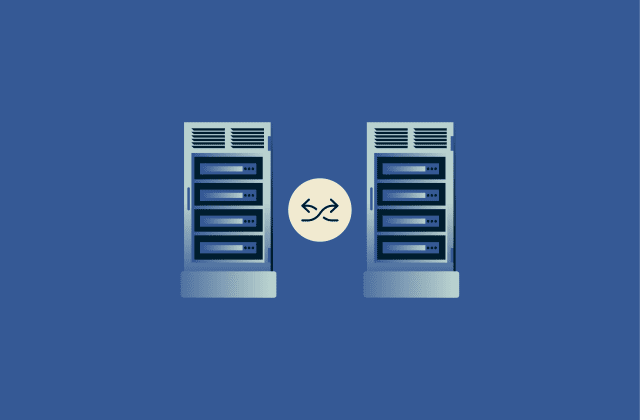Multi-hop VPN: Is it smarter than switching servers?

Using a virtual private network (VPN) is a great way to protect your privacy online, but sometimes people wonder whether routing traffic through more than one server adds meaningful benefits. A multi-hop VPN can be useful in certain high-risk scenarios, but for most people it’s not necessary, especially when your VPN already prioritizes strong encryption, privacy protections, and reliable speed.
Some VPNs include a multi-hop or double VPN option, but ExpressVPN has intentionally chosen not to. Our privacy model is built to give you the same protections people seek from multi-hop, like strong encryption, IP masking, and protection from trackers, without the speed loss or complexity.
In this guide, we’ll explore how multi-hop VPNs work, how they compare to simply switching servers, and why ExpressVPN has chosen a different approach that delivers the same protections with less complexity.
What is a multi-hop VPN?
A multi-hop VPN is like a regular VPN connection, but with an extra step. Instead of sending your traffic through one VPN server, it routes it through two or more before it reaches the internet. Each stop adds another layer of encryption and changes your IP address.
How does a multi-hop VPN work
Instead of taking a direct route through one server, your traffic passes through a chain of two (or more). Each server only sees part of the picture:
- The first knows your real IP address but not your destination.
- The second sees where the data is going, but not who sent it.
This separation can reduce traceability. Still, a high-quality single VPN server already hides your IP and encrypts all traffic, which is enough for most privacy needs without introducing extra complexity.
Multi-hop VPN vs. manually switching VPN servers
You might wonder, “Can’t I just disconnect from one server and connect to another?” Manually switching servers does change your IP and location, but it still only uses one server at a time. That server sees both where your connection starts and where it ends. A multi-hop VPN, on the other hand, splits that information between two servers.
That said, the core privacy difference is less dramatic than it might sound: both approaches give you a new IP address, and both rely on trusting your VPN provider’s infrastructure. For most users, switching servers when needed is simpler and more practical.
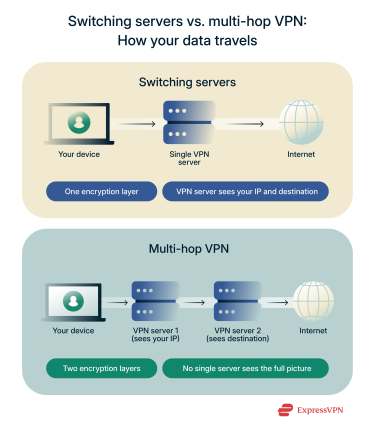
Is server switching enough?
For most users, manually switching servers is enough. It can help safely access your accounts from anywhere, troubleshoot connection issues, or avoid bandwidth throttling. What it doesn’t change is how your traffic is encrypted. Each connection relies on a single server that can see both your IP address and your destination.
Learn more: Find out whether you should keep your VPN active all the time.
When should you use a multi-hop VPN?
While a standard VPN is enough for most everyday activities, like browsing, streaming, or shopping, there are situations where a multi-hop VPN can give you added peace of mind.
You might want to use a multi-hop VPN if:
- When you’re concerned about online tracking: Routing your traffic through multiple servers can make it harder for internet service providers (ISPs) or other third parties to trace your activity.
- You work with sensitive or confidential information: Journalists, researchers, and professionals handling private data may benefit from the added security layer.
- You’re trying to avoid advanced tracking: Multi-hop makes it more difficult for advertisers or data brokers to build a profile based on your activity and metadata.
That said, if you're mostly using a VPN for everyday privacy, streaming content, or avoiding throttling, a regular, quality VPN, like ExpressVPN, is more than enough.
Double VPN and multi-hop: Are they the same?
The terms “double VPN” and “multi-hop VPN” are often used to describe the same general concept: routing your traffic through more than one VPN server before it reaches the internet.
While some VPN providers refer to this feature as “double VPN” and others as “multi-hop VPN,” there's no strict technical distinction between the two. In fact, the terminology can vary depending on the provider or context.
Some use "double VPN" to describe a two-server chain, while "multi-hop VPN" may suggest more than two hops or more customizable routing. But in practice, most built-in features offered by providers work similarly: your data is routed through a predefined sequence of secure servers to improve privacy.
If you're looking for ultimate flexibility, advanced users can even create their own custom VPN chains by combining multiple VPN services, but this falls outside the scope of what most providers label as double VPN or multi-hop.
Key benefits of using a multi-hop VPN
Multi-hop VPNs aren’t designed for everyday use, but in the right scenarios, they can offer important advantages:
Layered encryption for maximum anonymity
Each time your traffic passes through a VPN server, it gets encrypted again. In a multi-hop setup, this happens more than once. That means your data is wrapped in multiple layers of encryption before it reaches its destination. It helps reduce the chance of anyone tracing your activity through the network.
Protecting against advanced threats
If one server in the chain were ever compromised, it still wouldn’t reveal both who you are and where you’re going. That separation adds an extra layer of protection, especially in situations where privacy matters more than usual, like when trying to avoid tracking.

Are there any downsides to multi-hop?
Multi-hop is good for privacy, but it’s not perfect. The extra layers of encryption and rerouting can slow things down and may not work smoothly on all devices. It’s also a bit more technical to set up, depending on your VPN.
Speed considerations
Using a multi-hop VPN usually means slower speeds. That’s because your traffic has to travel through two separate VPN servers instead of one and gets encrypted twice. The extra distance and processing can make things a bit heavier. Here’s what some users might notice:
- Longer load times for websites or apps.
- Higher ping in online games.
- Buffering or delays during video calls or streams.
- Slower download/upload speeds, especially with large files.
The actual impact depends on several things:
- The distance between the VPN servers.
- The protocol you’re using (Lightway, WireGuard, OpenVPN, etc.).
- Your device’s processing power.
- Network congestion at the time of connection.
In some cases, especially with optimized servers and fast protocols, the slowdown is minimal. But if you're using server pairs on opposite sides of the globe or running multi-hop on a lower-powered device, the drop in performance can be more noticeable.
Setup and device compatibility
Using a multi-hop VPN isn’t always as simple as hitting “connect.” In many cases, you don’t get to choose your two servers freely; the provider usually gives you a preset pair. That limits flexibility and might not always match your ideal route.
If you try to create your own multi-hop setup (say, by combining two different VPN apps), you could run into issues. Many VPNs aren’t designed to run side by side, and you might get connection errors, conflicts, or one app overriding the other.
Things get even trickier on mobile devices. Multi-hop setups require more power and more data to encrypt, which can lead to:
- Faster battery drain, especially during long sessions.
- Heavier CPU usage, causing devices to heat up.
- App compatibility issues across different platforms.
Before jumping in, it’s a good idea to check:
- Does your VPN let you choose server pairs, or are they fixed?
- Is multi-hop supported across all your devices (desktop, mobile, router)?
- Are you okay trading a bit of battery life for stronger privacy?
Multi-hop VPN or Tor: What should you use?
Multi-hop VPNs and The Onion Router (Tor) network both improve privacy by routing your traffic through multiple points, but they work differently and are best suited for different needs.
A multi-hop VPN keeps your data within the VPN provider’s infrastructure. Your traffic travels through two or more of the provider’s servers, with each hop helping to separate your IP address from your final destination. The entire connection is encrypted end-to-end by the VPN tunnel. This setup is typically faster and more stable than Tor, making it a more practical option for streaming, downloads, video calls, and day-to-day browsing.
Tor, on the other hand, sends your traffic through a random path of volunteer-operated nodes (called relays). Each node removes a layer of encryption, and no single node ever sees both your IP address and the destination.
This design offers strong anonymity, but at a cost: Tor is significantly slower than most VPNs due to the random routing and limited bandwidth of its network. It’s best suited for activities where anonymity matters most, such as bypassing heavy censorship or safely accessing the dark web.
Can you combine Tor with a VPN?
Yes, you can use Tor over VPN or VPN over Tor, depending on your setup and threat model:
- Tor over VPN (most common): You connect to your VPN first, then open the Tor browser. Your ISP sees you using a VPN but not Tor, and the Tor entry node sees the VPN’s IP, not yours.
- VPN over Tor: More complex and less common. You connect to Tor first, then route VPN traffic through it. This setup can protect against malicious Tor exit nodes but is harder to configure.
Combining Tor with a VPN adds another layer of privacy but also increases complexity and may reduce performance even more. For most users, either tool alone is enough, but if you're facing serious risks, combining them can provide stronger protection.
Choosing a VPN with multi-hop capability
Not every VPN offers multi-hop routing, and even among those that do, the implementation can vary a lot. But the bigger question is whether you actually need it.
What to look for
If you’re evaluating multi-hop as a feature, keep in mind that its benefits depend entirely on the provider. More important than “two servers instead of one” are things like:

- Transparency in how multi-hop is implemented: Some providers let you choose your server pair, while others only offer preset combinations. But in practice, what matters is whether you understand how your traffic is being handled.
- Reputation and security practices of the provider: A multi-hop chain is only as private as the provider running it. A proven no-logs policy and independent audits are more valuable than extra hops.
- Performance trade-offs: Multi-hop almost always slows connections. If speed and reliability are important, optimized infrastructure and strong protocols are better indicators of quality.
- Platform support: Some multi-hop features are limited to desktop apps, so confirm it works on the device you plan to use.
- Encryption standards: Strong, modern encryption is the foundation of VPN privacy. Multi-hop only adds layers; it doesn’t replace the need for secure protocols.
Does ExpressVPN offer multi-hop?
ExpressVPN doesn’t offer a multi-hop or double VPN feature in the traditional sense, and that’s by design. Instead of adding complexity and slowing connections with extra hops, ExpressVPN prioritizes speed, simplicity, and strong core protections. Each server is engineered for security and reliability, so you get the same privacy benefits people look for in multi-hop, but faster and easier to use.
These protections include:
- RAM-only servers (TrustedServer technology).
- Strong encryption and protocols like Lightway and post-quantum WireGuard.
- A strict no-logs policy that’s been independently audited.
ExpressVPN also offers other privacy features, such as IP address rotation. With this enabled, your IP address automatically changes during your session and can vary by website, making it even harder for trackers to profile or follow you online.
FAQ: Common questions about multi-hop VPNs
Is a multi-hop VPN the same as a double-hop VPN?
These terms are often used to describe the same general idea: routing your traffic through more than one VPN server to improve privacy. Some people use "double-hop VPN" to refer specifically to two-server setups, while "multi-hop VPN" can suggest two or more hops. But in practice, there's no strict technical difference between them.
What is VPN hopping, and is it the same as multi-hop VPN?
VPN hopping usually means switching servers manually during a session. Multi-hop VPN, in contrast, routes your traffic through multiple servers in one connection. They’re different in how the path is created and used.
Can I chain two different VPN providers together?
Yes, you can chain VPNs from two different providers, but it requires a more advanced setup. The most reliable way to do this is to run one VPN on your device (like a laptop) and the other on your router or inside a virtual machine. This method avoids software conflicts and effectively creates a double-hop connection.
This setup is known as VPN chaining and gives you more control than most built-in multi-hop features. However, it takes some manual work, and not all systems (especially mobile devices) handle it well. Performance may also take a hit depending on the VPNs and server locations.
Does multi-hop VPN work for streaming and gaming?
It can, but it’s not ideal. Because multi-hop routes your traffic through more than one server, the connection usually slows down. That extra latency can cause issues like buffering in streaming or lag in online games. Some providers optimize for speed, but it depends heavily on your internet connection and the servers' locations.
Do free VPNs offer multi-hop features, and are they safe?
Most don’t. Multi-hop requires more resources, so it’s rare to find in free plans. And even if it’s available, there’s no guarantee the provider is secure or respects your privacy. Since multi-hop relies on solid infrastructure, using a trusted paid VPN is much safer.
Can I use a multi-hop VPN on mobile devices?
Sometimes, yes. Some VPN apps support multi-hop on iOS or Android, but others limit it to desktop versions. You may also face restrictions based on the operating system or VPN plan. Always check what’s available in the app before assuming it works on mobile.
Should I keep switching VPN servers manually?
Yes, switching servers when you need to is usually all that’s required. Because ExpressVPN encrypts all your traffic and hides your IP address, a single secure connection already provides strong privacy. Multi-hop only becomes useful in rare, high-risk scenarios.
Does multi-hop VPN offer stronger privacy than switching servers?
A multi-hop VPN routes your traffic through two servers instead of one, splitting the connection into separate parts. The first server knows your real IP address but not the website you’re visiting, and the second sees the destination but has no way of knowing who you are.
While this setup can make tracking harder, the added complexity and speed trade-offs mean it’s unnecessary for most. A single secure VPN server, combined with ExpressVPN’s privacy features, already provides comprehensive protection.
Take the first step to protect yourself online. Try ExpressVPN risk-free.
Get ExpressVPN




